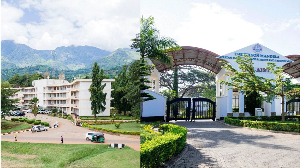A GNA Feature by Samuel Dowuona
Accra, Feb. 19, GNA - As the young and affable Mr Haruna Iddrisu Member of Parliament for Tamale South comes to office as Minister of Communications, one thing that mobile phone users in the country would expect him to deliver on is his promise to ensure that Mobile Number Portability (MNP) is implemented in Ghana.
During his vetting for the ministerial position Mr Iddrisu excited the mobile phone using public in Ghana with his refreshing pronouncement in answer to a question about MNP. He noted that the time had come for MNP to be implemented in Ghana particularly because there are six multi-national mobile phone network operators and that was enough for subscribers to be given the power of choice and luxury of flexibility. He then assured the Parliamentary Appointments Committee and the general public for that matter that the implementation of MNP would be one of his priorities as a Minister.
Mr Iddrisu, however, did not fail to recognise the need for a more vibrant regulation, industrial and technical environment characterised by a "stronger" regulator, cooperating industry players and an MNP friendly legal regime.
As a law maker himself and one time Minority Spokesperson on Communications, he assured the public of the "cordial relations" between the industry players and said he would capitalize on that to make MNP work.
This news sounds particularly heart warming for subscribers, but not necessarily palatable for all mobile phone network operators because of its implications, especially for those who have been in the system for some time now and whose subscribers continue to experience age old unacceptable network problems.
Speaking of age old network problems, whiles putting finishing touches to this article, this Writer could not make a call from his Zain phone to MTN between the hours of 1000 hours to 1600 hours on February 18, 2009. That indeed is a very good reason why MNP is necessary.
Advantages of MNP
As the Minister suggested, MNP would give the subscriber the power of choice and luxury of flexibility. In other words the subscriber would be empowered with a double edge sword to punish poor quality network service by migrating to another network and also keeping the number and network code that originally belongs to the previous service provider. MNP is one of two aspects of the concept of Number Portability (NP) which describes the migration of a phone number (network code inclusive) from one service provider to another; the other aspect of the concept is Local Number Portability (LNP). LNP refers to the porting of a landline or fixed line number from one service provider to another and MNP is when a mobile phone user changes service provider but maintains his phone number including the network code of the previous service provider. For instance, MNP makes it possible for a holder of mobile phone number 0238888888 on a network, X to migrate his number to another network, Y with code 025 and yet maintain the original number with the network code 0238888888 but get service from network Y.
The National Communication Authority (NCA) of Ghana was reported in the news late last year as saying that it was ironing out the prerequisite technical and legal details ahead of the implementation of MNP. But the NCA did not give any time frame within which the system would be implemented.
Meanwhile information gathered from some of the network operators in Ghana suggests that some other competitors were pulling strings at the NCA to delay the implementation of MNP, whiles the NCA staff members themselves were also divided on the matter. One could understand why some of the operators might want MNP stalled. But other operators are confident that with the Minister's professed support for MNP, NCA would have no other choice than to speed up the process to ensure its implementation soon.
Whiles MNP is a desirable system, particularly for subscribers, its implementation could either benefit or be a source of discomfort for them, depending on what form it takes. A lot of that also would depend on what system of porting the regulator (NCA) and the industry players agree on. Subscribers must hope that even though there are interconnectivity issues still pending among the industry players, they would draw on the cordiality that exists between them and agree on a subscriber friendly MNP system ultimately. At least some of the players are involved in co-location deals, ("co- location" is the arrangement which allows networks to mount their cell sites on the same mast) so subscribers can count on their collaboration in the implementation of MNP as well.
Different types of MNP
MNP is currently operational in at least 34 countries. Its implementation takes different forms in different jurisdictions, depending on the peculiar regulation regime of individual countries. But in a generic sense, the international best practices, particularly in Europe, is for a customer wishing to port his/her number to contact the new provider, who is the recipient. The recipient will then arrange the necessary process with the old provider, who is the Donor. That process is known as 'Recipient-Led' porting. This system of porting works around the globe except in the United Kingdom (UK).
In the UK, a customer wishing to port his/her number is required to contact the Donor to obtain a Port Authorisation Code (PAC) which he/she then has to give to the Recipient. Having received the PAC the Recipient continues the port process by contacting the Donor. This form of porting is also known as 'Donor-Led' porting. The donor-led porting has been criticised by some industry analysts as being inefficient. One of the reasons cited is that it may act as a customer deterrent as well as allowing the donor an opportunity of 'winning-back' the customer. This, according to experts, might lead to distortion of competition, especially in emerging markets like Ghana with new entrants that are yet to achieve scalability of operation.
Those challenges and many others, which would be discussed later, led the UK telecom regulator, Ofcom to mandate a Recipient-led porting system to replace the Donor-led system in that country by 1st September 2009.
It is important for stakeholders in Ghana's industry, including the regulator (NCA) to, therefore, draw on what is going on round the world in the developed markets in deciding what kind of porting system we adopt when MNP comes onboard. Obviously Recipient-led porting is in the main the international standard now, not only because it is subscriber friendly, but also because it makes MNP meaningful.
Another significant technical aspect of MNP, which the Ghanaian stakeholders must consider is related to the routing of calls or mobile messages (SMS, MMS) to a number that has been ported. There are various flavours of call routing implementation across the globe but the international best practice is via the use of a central database (CDB) of ported numbers. Network operators generally hold local copies of CDB and refer to it to find out which network to send a call to. This is also known as All Call Query (ACQ) and is highly efficient and scalable. Majority of the established and upcoming MNP systems across the world are based on this ACQ/CDB method of call routing.
In the UK where the porting system is still Donor-led, ACQ/CDB is not practical. Instead, calls to ported number are still routed via the Donor network. This is also known as 'Indirect Routing' and is highly inefficient as it is wasteful of transmission and switching capacity. Because of its Donor dependent nature, Indirect Routing also means that if the Donor network develops a fault or goes out of business, the customers who have ported out of that network will lose incoming calls to their numbers. This will obviously defeat the purpose of MNP and, therefore, makes Donor-led portability very much undesirable. No regulator would tolerate Donor-led porting, unless the purpose is to frustrate the subscriber.
Again on routing of calls, MNP also impacts the internet telephony or Voice over Internet Protocol (VO IP) business. A voice call originated in the VOIP environment, like Skype, which is routed to a mobile phone number of a traditional mobile carrier also faces challenges to reach its destination in case the mobile phone number is ported. Even though VOIP is more affordable than regular phone to phone calls, it is not very popular in Ghana so the impact of MNP on VOIP may not be much of a big challenge in Ghana, except when it has to do with calls from overseas through VOIP.
Porting Turn-Over Time
Another very important factor in the whole MNP business is the question of porting turnover time. Prior to March 2008 it took a minimum of 5 working days to port a number in the UK compared to 2 hours only in USA, as low as 20 minutes in the Republic of Ireland and even a remarkable 3 minutes in Australia. On 17 July 2007, Ofcom, the UK regulator, released its conclusions from the review of UK MNP and mandated reduction of porting time to 2 working days with effect from 1 April 2008. The most recent Ofcom mandate for porting time, based on another study in November 2007 is two hours, beginning from 1st September 2009.
Clearly turnover time for porting is as low as three minutes in Australia and maximum of two hours in the USA and soon in the UK. Ghana can draw very valuable lessons from those experiences. One very important trend worthy of note is the proactive attitude of the regulator, particularly in the UK, towards ensuring a friendly portability environment. Within a matter of one year, the UK regulator, Ofcom undertook at least two research activities, which yielded instant results in the form of reduction of turnover time from five to two working days and later from two working days to two hours in the same year. That clearly shows the strength and vibrancy of the regulator. One wonders if the same could be said of Ghana's regulator, the NCA. To quote the Minister of Communications, "we need a stronger regulator" - that speaks volumes about the capability of NCA as it is now.
Strong Regulator
Speaking of the role of the regulator, recently the NCA announced the sale of new network codes to some mobile phone and landline service providers, a move that industry experts have described as anti-MNP. Formerly network codes used to come with the licence to operate telecom services, but over the past few years, NCA has resorted to selling network codes for reason not yet clear to the public.
In the assertion of the experts, for instance the porting of numbers bearing a network code like 054, which was sold to MTN, would place a financial burden on the subscriber because the operator is most likely to demand money as a way of either preventing the subscriber from migrating or just for mere frustration. That sounds like the regulator is rather aiding anti-MNP machinations by those operators who seem scared of MNP.
The regulator needs to take a clear stand as to whether they are interested in MNP and for that matter in the interest of the subscriber, or they are in bed with some of the service providers as other service providers alleged in the past.
There might not be a very committed regulator as yet, but from all indication there is now a committed Minister and that gives subscribers a lot of hope that after all someone cares about the rather sticky services that some of the networks are providing.
When MNP becomes operational, subscribers need to be aware of two basic things - when one ports his or her number from one service provider to the other, one automatically loses the services and features offered by the former service provider and would have to use the services and features offered by the new provider. It also means that one would be free of any network challenges on the previous network, if any, and would have to embrace challenges on the new one if any. But a prudent MNP move is the one from a problematic network to a relatively less problematic or problem free one. The other vital thing to note is that, in migrating from one network to the other, one needs not cancel the existing mobile service arrangements before changing providers because a cancelled service would prevent one's existing number from being successfully ported and used. 19 Feb. 09
Opinions of Saturday, 21 February 2009
Columnist: GNA














